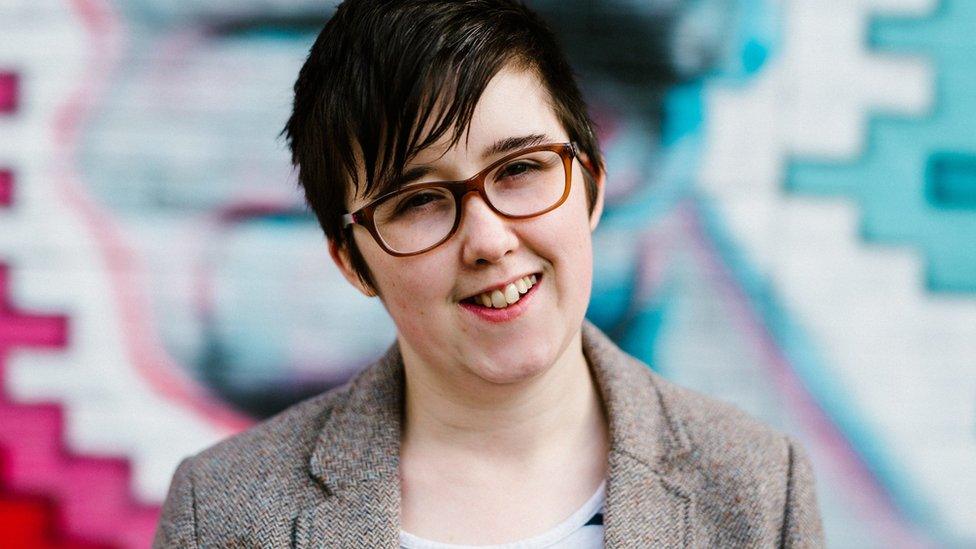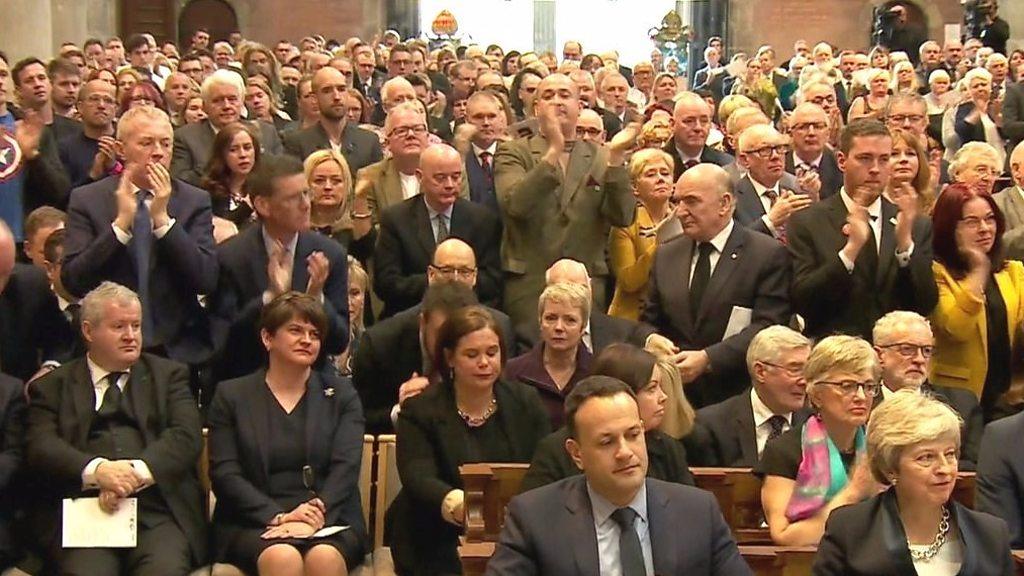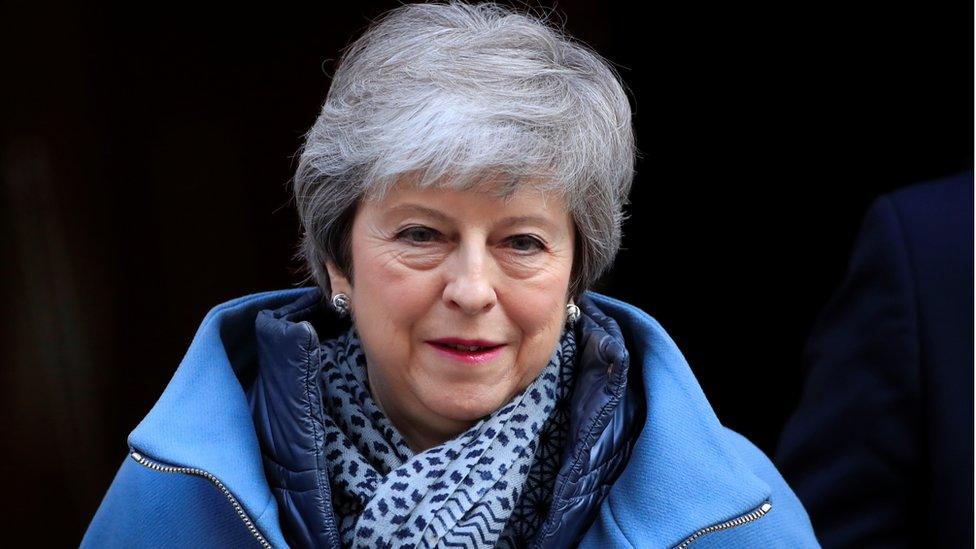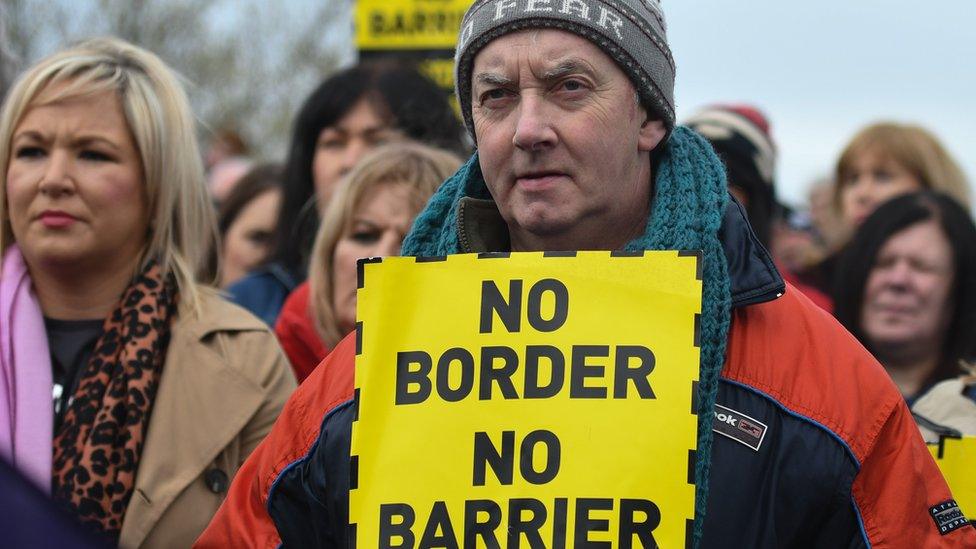Brexit: McKee death 'shows need to solve Irish border issue'
- Published
As mourners arrive at the funeral of journalist Lyra McKee, her murder is raised at PMQs
The death of journalist Lyra McKee shows the need to "find an answer" to the Irish border question in the Brexit talks, Emily Thornberry has said.
The shadow foreign secretary urged ministers to accept that a customs union with the EU was the way to avoid a hard border and preserve peace.
Cabinet Office Minister David Lidington rejected a link between the border or customs arrangements and the murder.
Treasury minister Liz Truss said it was "very wrong" to connect the two.
Prime Minister Theresa May, President of Ireland Michael D Higgins, Taoiseach (Irish prime minister) Leo Varadkar and Labour leader Jeremy Corbyn were among those who attended Ms McKee's funeral in Belfast.
She was shot dead on Thursday while observing rioting in Londonderry.
Cross-party talks have been going on for a number of weeks to try to break the Brexit impasse.
On Tuesday, the prime minister's spokesman hinted that Labour was slowing down the process, while Jeremy Corbyn blamed the government for the ongoing deadlock.
One of the main sticking points is how to maintain an open border on the island of Ireland after Brexit when it becomes the dividing line between the UK and the EU.
'Get serious'
Ms Thornberry, who was standing in for Mr Corbyn at Prime Minister's Questions, said the statement from the New IRA accepting responsibility for the death of Ms McKee was a "sickening throwback to the days we thought we'd left behind 20 years ago".
"This is one of the central reasons we must find an answer to the Northern Irish border question rather than give these evil terrorists the divisions that they crave," she said.
She urged the government to get "serious" about the cross-party talks and realise that Labour's preferred option of a customs union with the EU was the obvious solution.
Labour says this would remove the need for customs checks and potentially controversial infrastructure at the border.
Mr Lidington, Mrs May's de facto deputy, said he did not believe those behind Ms McKee's killing "were motivated by any thoughts about the border or customs arrangements".
He said the "substance" and "tone" of the cross-party talks had been "constructive".

Emily Thornberry says Lyra McKee's death shows the need to solve the Brexit Irish border issue
"I think there is a genuine attempt to try to find a way through," he said.
"But I'm not going to hide the fact that this is very difficult, because if it's going to work it'll mean both parties needing to make compromises and us ending up with a solution that unlike any other so far proposed will get a majority in the House."
PMQs: Emily Thornberry and David Lidington on Irish border and backstop
However, Ms Thornberry said the government did not appear to have plans on how to maintain an "invisible border" between Northern Ireland and the Republic of Ireland after Brexit.
She quoted a leaked Home Office presentation, which said there was no budget for such a scheme and it could not be introduced before 2030 due to technological constraints.
Mr Lidington said the government had invested £20m to work on "alternative measures" that would bring seamless trade to the border.
'Brave'
Chief Secretary to the Treasury Liz Truss told BBC Politics Live that Ms Thornberry was "very wrong to link that whole debate with that appalling act of terrorism".
"The prime minister has always been absolutely clear that the union is her number one priority," she said.
"It's the reason that we've been so careful and I don't think it is right to link those two issues in Prime Minister's Questions."
But Liberal Democrat MP Layla Moran said Ms Thornberry was "right" and "brave" to make the link.
BBC political editor Laura Kuenssberg said it was "surprising" how explicit Ms Thornberry was in doing so.
She said there were very real fears from all communities about a potential rise in violence in Northern Ireland and the Republic, but David Lidington not willing to make that explicit connection himself.
"I suspect not everyone in the House of Commons will be comfortable that she made it," our correspondent added.
- Published24 April 2019

- Published30 July 2019

- Published24 April 2019

- Published6 August 2019

- Published16 October 2019
